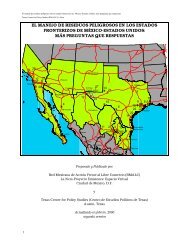Pesticides and Water Quality - Texas Center for Policy Studies
Pesticides and Water Quality - Texas Center for Policy Studies
Pesticides and Water Quality - Texas Center for Policy Studies
Create successful ePaper yourself
Turn your PDF publications into a flip-book with our unique Google optimized e-Paper software.
making available better pesticide use data. Ultimately,if the state plan is not adequate, the U.S. EnvironmentalProtection Agency could move to ban the use of thepesticides, which could have significant economicconsequences <strong>for</strong> <strong>Texas</strong> farmers.D. Solution: PesticideUse ReportingBecause it is too expensive to test <strong>for</strong> all pesticides ineach water body, state regulators, local governments <strong>and</strong>drinking water suppliers must carefully target the limitedresources available <strong>for</strong> testing <strong>and</strong> analysis ef<strong>for</strong>ts.Pesticide use data is the key to being able to target <strong>and</strong>track the effectiveness of water quality monitoring,source water protection <strong>and</strong> water pollution reductionprograms.Pesticide use data will: (1) allow better targeting of thevery limited resources available <strong>for</strong> testing <strong>for</strong> pesticidesin surface water, fish <strong>and</strong> ground water; (2) allow <strong>for</strong>more scientifically-sound source water assessments toprotect drinking water <strong>and</strong> to evaluate monitoring waiverdecisions; <strong>and</strong> (3) provide scientifically-sound data <strong>for</strong>the state’s groundwater management plans <strong>for</strong> pesticides.Pesticide use data would also help water protectionauthorities more quickly identify <strong>and</strong> remedy any usesthat are posing potential risks to surface water or groundwater.A pesticide use reporting system <strong>for</strong> both agricultural<strong>and</strong> non-agricultural uses of pesticides would provideagencies <strong>and</strong> the public with in<strong>for</strong>mation on when,where, what types <strong>and</strong> in what quantities pesticides areused in <strong>Texas</strong>. This in<strong>for</strong>mation, in turn, could be usedby TNRCC <strong>and</strong> other agencies, public water supplysystems <strong>and</strong> others to greatly enhance theimplementation <strong>and</strong> effectiveness of those water qualityprotection programs. The availability of pesticide usereporting data would have the following specific benefits<strong>for</strong> water quality protection in <strong>Texas</strong> 9 .• Provide site-specific in<strong>for</strong>mation on pesticideuse <strong>for</strong> drinking water source assessments <strong>and</strong>9 PUR also has many other benefits. See TCPS, Realm of the Unknown:Pesticide Use in <strong>Texas</strong> (TCPS: Austin, 1998).9




